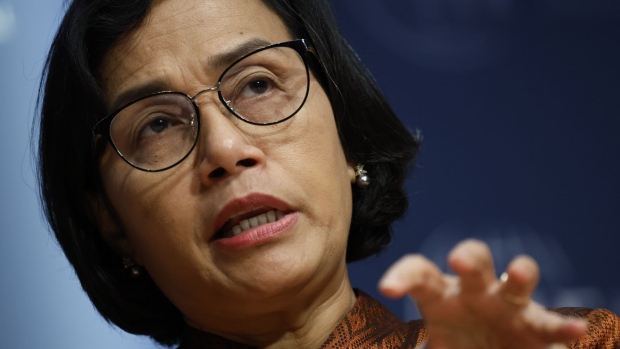Apr 18, 2024
Indonesian Finance Chief Aims to Shield Economy From Dollar Rise
, Bloomberg News

(Bloomberg) -- Indonesia said fiscal and monetary policies are in sync to cushion the economy from the rising dollar, demonstrating an all-hands-on-deck approach, with the central bank signaling they’re intervening more actively to aid the rupiah.
“We work very closely with Governor Perry in order for us to be able to adjust the macro stance to adapt with this new level of pressure,” Finance Minister Sri Mulyani Indrawati said in a Bloomberg Television interview on Thursday, referring to Bank Indonesia’s top policymaker.
Indonesia is focused on ensuring that fiscal policy can work as “an effective and credible shock absorber,” she said on the sidelines of the International Monetary Fund and World Bank Group meetings in Washington, DC.
Governor Perry Warjiyo said in a statement from DC that the BI — whose key mandate is to ensure currency stability — will also continue to support the rupiah “with foreign exchange interventions and other necessary measures.” Hours later, the central bank said it’s intervening “more boldly” in FX markets.
The comments came as news of Israel’s retaliatory strike against Iran roiled markets, pushing currencies including the rupiah to multi-year lows against the dollar on Friday. Indonesia’s currency has been among the hardest hit in Asia this month, extending its decline to more than 2.5% in April to a four-year low.
The rupiah dropping beyond the key level of 16,000 versus the greenback — for the first time since 2020, prompted the BI to step up its interventions in the market to stem the fall. It’s also adding pressure on the central bank to raise the benchmark rate further on April 24.
“The increasingly all-of-government response is revealing a level of concern that implies a higher risk of a larger, 50bps hike (to 6.5%),” Barclays Plc economist Brian Tan wrote in Friday note.
If the BI holds at 6%, it will likely sound hawkish and hint at the possibility of future hikes, Barclays said. Only six of 21 economists surveyed by Bloomberg so far expect the central bank to hike by 25 basis points on Wednesday, with the rest predicting a hold.
The governor, who surprised markets with a tightening in October amid the rupiah’s rout, earlier this week said that the central bank is always in the market. In the statement dated Friday, he said the BI will manage foreign flows in a market-friendly manner, underscoring the importance of stabilizing exchange rate for the nation’s resilience.
Southeast Asia’s biggest economy on Thursday told its state-owned enterprises to refrain from making large dollar purchases for its import or debt servicing requirements to avoid adding pressure on the rupiah. Natural-resource exporters were also reminded to comply with rules to repatriate dollar earnings to shore up the nation’s currency reserves.
Indrawati, during the interview in DC, said that while the strong dollar can increase the revenue from exports, it also risks adding inflationary pressures through imports.
Fiscal Outlook
Doubts over the incoming government’s fiscal policy have also been keeping the rupiah under pressure, with foreign investors sidestepping Indonesia’s debt market on concerns over Pesident-elect Prabowo Subianto’s free-lunch program.
Without a clear financing strategy, the program could put Indonesia’s debt load at risk and threaten its investment-grade sovereign rating, which was recently affirmed by Fitch Ratings and Moody’s Ratings.
Indrawati, who will end her tenure as finance minister in October, said the budget deficit will remain under 3% and that Indonesia can sustain its 5% economic growth this year amid the higher-for-longer interest rate environment.
“Fiscal policy that is adjusting to many structural issues, but at the same time maintained in prudent principle is going to be very important,” Indrawati said.
--With assistance from Claire Jiao and Ben Sills.
(Adds Bank Indonesia’s statement, economist comment.)
©2024 Bloomberg L.P.





